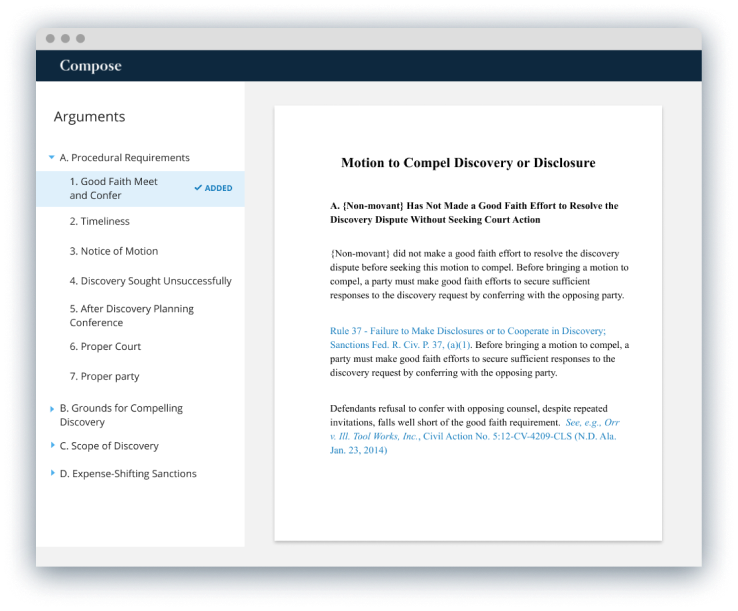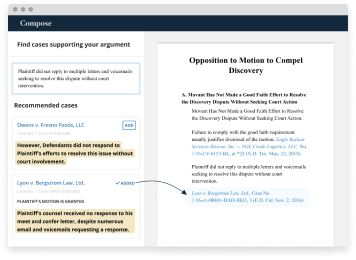Casetext’s new litigation automation technology, Compose, automates substantive legal work — and a substantial number of billable hours.
SAN FRANCISCO — Casetext, the legal technology company known for its groundbreaking A.I. legal research platform, today announces a new product that will define litigation automation: Compose. Compose, which automates the first draft of a legal brief, is poised to disrupt the $437 billion legal services industry and fundamentally change our understanding of what types of professional work are uniquely human.

Writing the first draft of a brief is historically a complicated process that often takes 10-80 hours of billable work: searching case law databases, consulting treatises, digging through brief banks, etc. Compose enables an attorney to construct a compelling, well-supported legal argument in 20 minutes. You simply enter basic information about the brief you want to draft, and Compose provides the available arguments and applicable legal standards, which you can add with a click.
Compose is powered by Parallel Search, a breakthrough new search technology developed by Casetext. Parallel Search, which applies a transformer-based neural language model (the latest technique in NLP), automates the process of finding legal precedent to support the attorney’s argument.

“Traditional search technology matches based on words and synonyms. That only gets you so far in the law, where arguments are based on concepts and analogies,” says Javed Qadrud-Din, Casetext’s Director of Machine Learning and an ex-lawyer. “Parallel Search finds documents that contain matching concepts, even if they don’t use any of the same language.”
Leading law firms – including Ogletree Deakins, Sheppard Mullin, and Bowman and Brooke – are already embracing the technology. They see it as a competitive edge in an industry where clients want to work with firms that will produce high-quality work product efficiently.
“Casetext has clearly examined writing motions as part of an attorney’s work, and they have come up with a groundbreaking new way of automating a good part of that process. I think that is going to make it one of the most important tools in our attorneys’ toolkit,” says Flyn Flesher, Knowledge Management Counsel Supervisor at Ogletree Deakins.
Compose’s automation of motion practice stands to reshape the $437 billion per year spent on legal services in the United States. Fortune 200 companies each spend an average of $140 million per year on legal services. Leveraging Compose will enable them to dramatically cut that spending without compromising on the quality of their representation.
“After automation, what’s left are the most interesting, substantive, strategic parts of legal practice, without the drudgery, the expense, and the inefficiency,” says Jake Heller, Casetext CEO and co-founder. “We’re making space for lawyers to make new arguments, pursue new strategies, and experiment with new business models. But what’s maybe most exciting about this, and any truly innovative technology, is that we don’t know exactly what the impacts will be. Automation allows for imagination.”
Attorneys interested in trying Compose can visit compose.law or contact sales@casetext.com for more information.
About Casetext:
Casetext is a legal technology company that automates critical elements of legal practice in order to empower attorneys to provide consistently high-quality and cost-effective representation. CEO Jake Heller left practice as a litigator at Ropes & Gray to found Casetext in 2013. He was soon joined by co-founders (and fellow attorneys) Pablo Arredondo (CPO) and Laura Safdie (COO & GC). In 2016, Casetext released its comprehensive legal research platform — now used by over 5,000 U.S. law firms — which leverages A.I. technology to automate much of legal research. In 2020, Casetext made the next big leap in litigation automation with Compose: first-of-its-kind technology that automates critical, substantive elements of litigation.
Casetext press contact:
Hannah Doherty
(317) 407-0790
hannah@casetext.com
Rapidly draft common legal letters and emails.
How this skill works
Specify the recipient, topic, and tone of the correspondence you want.
CoCounsel will produce a draft.
Chat back and forth with CoCounsel to edit the draft.
Get answers to your research questions, with explanations and supporting sources.
How this skill works
Enter a question or issue, along with relevant facts such as jurisdiction, area of law, etc.
CoCounsel will retrieve relevant legal resources and provide an answer with explanation and supporting sources.
Behind the scenes, Conduct Research generates multiple queries using keyword search, terms and connectors, boolean, and Parallel Search to identify the on-point case law, statutes, and regulations, reads and analyzes the search results, and outputs a summary of its findings (i.e. an answer to the question), along with the supporting sources and applicable excerpts.
Get answers to your research questions, with explanations and supporting sources.
How this skill works
Enter a question or issue, along with relevant facts such as jurisdiction, area of law, etc.
CoCounsel will retrieve relevant legal resources and provide an answer with explanation and supporting sources.
Behind the scenes, Conduct Research generates multiple queries using keyword search, terms and connectors, boolean, and Parallel Search to identify the on-point case law, statutes, and regulations, reads and analyzes the search results, and outputs a summary of its findings (i.e. an answer to the question), along with the supporting sources and applicable excerpts.
Get a thorough deposition outline in no time, just by describing the deponent and what’s at issue.
How this skill works
Describe the deponent and what’s at issue in the case, and CoCounsel identifies multiple highly relevant topics to address in the deposition and drafts questions for each topic.
Refine topics by including specific areas of interest and get a thorough deposition outline.
Ask questions of contracts that are analyzed in a line-by-line review
How this skill works
Allows the user to upload a set of contracts and a set of questions
This skill will provide an answer to those questions for each contract, or, if the question is not relevant to the contract, provide that information as well
Upload up to 10 contracts at once
Ask up to 10 questions of each contract
Relevant results will hyperlink to identified passages in the corresponding contract
Get a list of all parts of a set of contracts that don’t comply with a set of policies.
How this skill works
Upload a set of contracts and then describe a policy or set of policies that the contracts should comply with, e.g. "contracts must contain a right to injunctive relief, not merely the right to seek injunctive relief."
CoCounsel will review your contracts and identify any contractual clauses relevant to the policy or policies you specified.
If there is any conflict between a contractual clause and a policy you described, CoCounsel will recommend a revised clause that complies with the relevant policy. It will also identify the risks presented by a clause that does not conform to the policy you described.
Get an overview of any document in straightforward, everyday language.
How this skill works
Upload a document–e.g. a legal memorandum, judicial opinion, or contract.
CoCounsel will summarize the document using everyday terminology.
Find all instances of relevant information in a database of documents.
How this skill works
Select a database and describe what you're looking for in detail, such as templates and precedents to use as a starting point for drafting documents, or specific clauses and provisions you'd like to include in new documents you're working on.
CoCounsel identifies and delivers every instance of what you're searching for, citing sources in the database for each instance.
Behind the scenes, CoCounsel generates multiple queries using keyword search, terms and connectors, boolean, and Parallel Search to identifiy the on-point passages from every document in the database, reads and analyzes the search results, and outputs a summary of its findings (i.e. an answer to the question), citing applicable excerpts in specific documents.
Get a list of all parts of a set of contracts that don’t comply with a set of policies.
Ask questions of contracts that are analyzed in a line-by-line review
Get a thorough deposition outline by describing the deponent and what’s at issue.
Get answers to your research questions, with explanations and supporting sources.